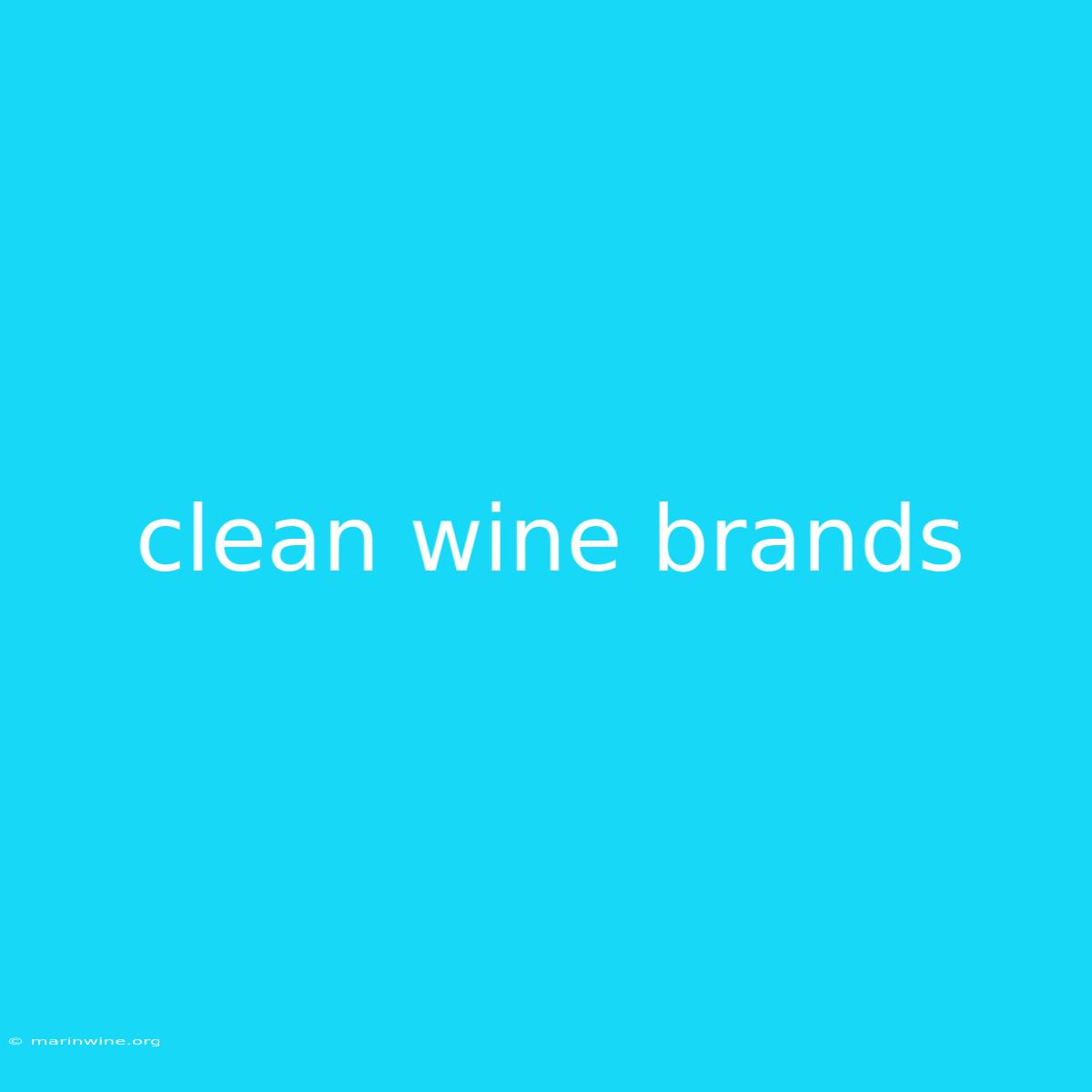Uncorking the Goodness: Unveiling Clean Wine Brands for Conscious Sipping
Have you ever wondered what goes into your wine? It's more than just grapes and sunshine! The growing demand for clean wine brands reflects a shift towards conscious consumption, where quality and ethical practices are paramount.
Why This Matters
In a world increasingly concerned with environmental impact and personal well-being, clean wine is gaining traction. This movement seeks wines produced with minimal intervention, emphasizing organic farming, biodynamic practices, and natural winemaking techniques. It's not just about the taste; it's about the entire journey from vineyard to bottle.
Key Takeaways of Clean Wine
| Characteristic | Description |
|---|---|
| Organic Farming | Excludes synthetic pesticides, herbicides, and fertilizers. |
| Biodynamic Practices | Utilizes holistic farming methods, respecting the natural rhythms of the earth. |
| Natural Winemaking | Minimal intervention, with less manipulation of the wine during production. |
| Sustainable Practices | Focuses on environmental protection and responsible resource management. |
| Transparency | Open communication about winemaking processes and ingredients. |
Unveiling the Clean Wine Movement
The Growing Awareness
Consumers are becoming increasingly discerning about what they consume, particularly in relation to health and environmental concerns. Clean wine addresses these concerns by prioritizing natural processes and sustainable practices.
Beyond the Bottle
This movement extends beyond the wine itself. Clean wine brands often embrace eco-friendly packaging, reducing their carbon footprint and promoting responsible practices across the supply chain.
Flavor Profiles
Clean wines, with their minimal intervention, often showcase distinct flavors and aromas, reflecting the unique terroir and varietal characteristics.
The Quest for Clean Wines
**Finding clean wine brands is no longer a niche pursuit. ** Many established wineries are adopting sustainable practices, while new brands are emerging with clean winemaking at their core.
Here are some key aspects to consider when seeking clean wine:
Organic Certification
Look for certifications like USDA Organic or EU Organic to ensure adherence to strict organic farming standards.
Biodynamic Certification
The Demeter Certification or Biodynamic Farming Association certifications indicate adherence to biodynamic principles.
Natural Wine
While there's no formal certification for natural wine, reputable producers often use terms like "natural," "low intervention," or "unfined/unfiltered" on their labels.
Sustainability Practices
Research wineries' commitment to sustainable practices through their websites or through independent resources.
Transparency
Seek out brands that are transparent about their winemaking practices and ingredient sourcing.
FAQ for Clean Wine
Q: Are Clean Wines Better for You? A: Clean wines often contain fewer sulfites, which can be a concern for some individuals. However, it's crucial to consult with a healthcare professional for any specific dietary needs or sensitivities.
Q: Do Clean Wines Taste Different? A: Clean wines can have a distinctive flavor profile due to the absence of certain additives and the emphasis on natural fermentation. Some might find them more expressive or complex.
Q: Are Clean Wines More Expensive? A: The cost of clean wine can vary depending on the brand, region, and production methods. However, the growing demand is leading to more accessible options.
Q: Where Can I Find Clean Wine Brands? A: Specialty wine shops, online retailers, and some supermarkets carry clean wine brands. Check their websites or ask staff for recommendations.
Tips for Exploring Clean Wine
- Start with a tasting: Many wine shops or events offer clean wine tastings, allowing you to explore different brands and styles.
- Read labels carefully: Look for certifications and keywords like "organic," "biodynamic," "natural," or "sustainable."
- Research wineries online: Visit websites and social media pages to learn about their practices and philosophies.
- Join online communities: Connect with other clean wine enthusiasts for recommendations and discussions.
- Support local producers: Explore wineries in your area that practice sustainable winemaking.
Summary of Clean Wine
This article has explored the growing movement of clean wine brands, highlighting the commitment to sustainable practices, transparency, and natural winemaking techniques. As consumers become more conscious about their choices, clean wine offers a delicious and ethical approach to enjoying the pleasures of wine.
Closing Message
Whether you are a seasoned wine connoisseur or a curious newcomer, exploring clean wine brands presents a wonderful opportunity to savor quality wines while contributing to a more sustainable future. Let's raise a glass to clean wine and its promise of a better world, one sip at a time.

